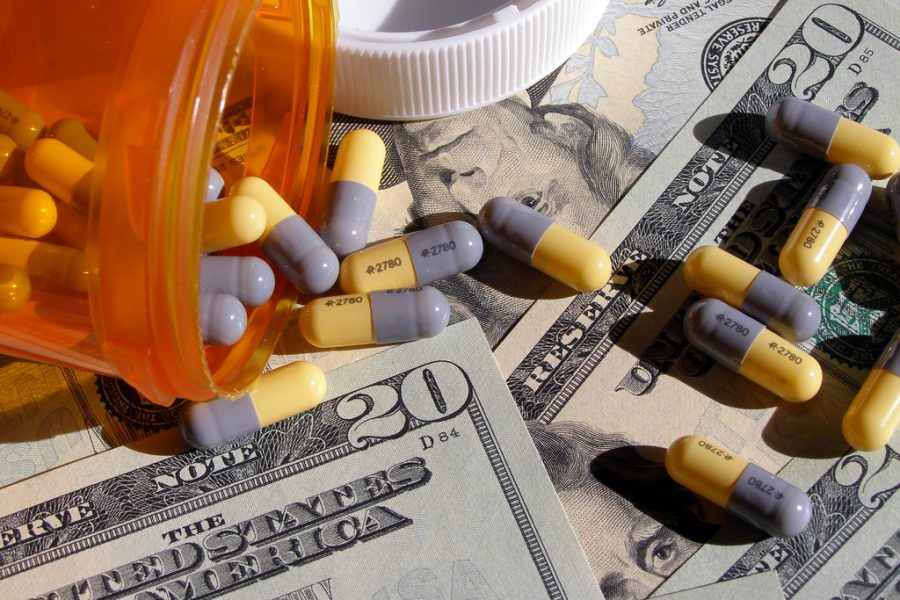Op-ed: Big Pharma’s true influence
“Prescription Prices Ver5” by ccPixs.com is licensed under CC BY 2.0
Big pharmaceutical companies have a history of participating in controversial practices.
February 9, 2021
In January 2020, I began my first semester on-campus at Northeastern and my second year taking Effexor, an antidepressant. One day, I mistakenly ran out of the medication, and, due to a pharmacy mix-up, it wouldn’t be refilled before the following afternoon.
By the time I returned from the fiasco that is the Massachusetts Ave. CVS to my dorm in International Village, I had missed my usual dosage time by about an hour and began to experience debilitating symptoms. I was shaking, nauseous and had an electric popping sensation in my brain which all caused me to cry uncontrollably.
Terrified by my apparent dependence on the drug, I decided to begin weaning myself off the medication. However, over the next several months, the symptoms only worsened. The zapping sensation intensified, I lost my ability to focus and I began having panic attacks for the first time in my life.
As a first-year at the time, I was reluctant to reach out to UCHS for help — all I had heard were horror stories about overworked staff and subpar treatment quality. I called my doctor and pharmacist searching for answers, but they were unfamiliar with the symptoms and suggested I just wait it out. According to the American Psychological Association, “[M]ost antidepressants are prescribed by primary-care physicians who may have limited training in treating mental health disorders.” This was proven true as my doctor was totally unfamiliar with my withdrawal symptoms.
As a last resort, I began researching my symptoms and trying to find others who shared my experience. I found Facebook groups containing dozens of people who had similar experiences with Effexor and were calling for the drug’s ban. I found studies detailing withdrawal symptoms that left some patients in the emergency room believing they were having strokes or nervous breakdowns. How was it possible that this many people were prescribed a drug without being made aware of the severe side effects that came with withdrawal?
In most instances, it is not a case of doctors withholding information. Rather, it is a case of doctors’ ignorance, influence from big pharmaceutical companies and the naivety of patients.
In 2001, Dr. Daniel Carlat, a psychiatrist in Newburyport, Massachusetts was hired by Wyeth Pharmaceuticals to travel to doctor’s offices and convince them to prescribe Effexor over other medications. Carlat and his colleagues were “wined and dined” and “treated like the anointed” in exchange for $500 an hour and turning a blind eye to the studies that showed Effexor in a negative light. Once Carlat disclosed the drug’s dangers in his presentations, he said he lost his drug marketing side-hustle.
Thus, general physicians are educated by big pharmaceutical companies — who fund 85% of all drug research and feel little obligation to patients’ conditions — and are left with skewed perspectives of the benefits and dangers of certain drugs. This, combined with a patient’s idealistic belief that their doctor will choose the most beneficial treatment option, means that millions of Americans who seek mental health treatment are left at the mercy of big pharma and end up blindly accepting prescriptions without truly understanding the risks.
While I strongly believe it is not a patient’s responsibility to be a prescription expert, I do feel that the only way to protect yourself from this situation is to research your anxiety or depression medication before you agree to take it. We must normalize asking physicians why they chose to prescribe a certain drug over another. You will be shocked to find there is often no reason behind the decision, and you may even be surprised to discover that your prescription is the direct result of a drug representative’s influence. Additionally, it is important to establish an exact diagnosis. Do you have a chemical imbalance causing your mental health issues or is it situational? Do you need to be medicated for the rest of your life or the rest of the semester? For others struggling to come off antidepressants, I encourage you to reach out to find others who share your experience and work with your physician to develop a tapering plan; preserving your mental health is paramount, especially amidst the COVID-19 pandemic.
It is now February 2021. Six months after taking my final dose, I still have a hard time focusing and I struggle with feelings of emotional numbness — but this is nothing compared to the withdrawal symptoms I experienced. While I am grateful to be Effexor-free, this suffering could have been avoided if only I knew the risks of the drug when it was prescribed to me.
Ella Witt is a second-year journalism and political science major. She can be reached at witt.el@northeastern.edu.







